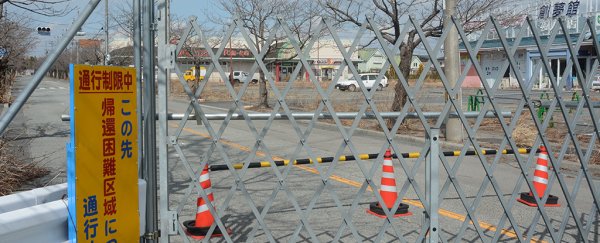Assuming you've been living on Earth since the nuclear reactor at Fukushima in Japan was struck by a tsunami in March 2011, there's a good chance you copped about 1,000 bananas' worth of radiation over the past six years as a result of the meltdown.
That's what the Norwegian Institute for Air Research calculated, based on how far two radioactive isotopes of caesium have spread, putting the dosage for most people outside Japan at less than 0.1 millisievert – also equivalent to receiving one X-ray.
Of course, if you happened to be a little closer to the event – say, in Japan – the average dose over the few years that followed was closer to 0.5 millisieverts, which isn't even close to what you'd get if you underwent a computed tomography (CT) scan in hospital.
The researchers used data gathered by Comprehensive Nuclear-Test-Ban Treaty Organisation, a group that keeps an eye out for nuclear explosions around the globe by measuring things like seismic activity and radioactive particles in the atmosphere.
One of those particles they've got records of is called caesium-137 – a heavy element that can travel long distances thanks to its talent for dissolving in water, making it a useful marker for measuring the radioactive reach of the disaster.
The team estimated that about 23 percent of the caesium-137 released by Fukushima in the wake of the tsunami stayed in Japan, while the rest fell into the oceans.
All of this talk of wide-spread doses of radiation can be a little confronting, so here's a short breakdown of the units behind radiation, and why we don't need to panic.
Two units commonly used to describe amounts of radiation are becquerels (Bq) and sieverts (Sv).
Becquerels describe the radioactivity part – 1 Bq is the same as one particle decaying every second.
Grab your nearest banana, and you'll be holding in your hand about 100 grams (3.5 ounces) of delicious sweetness infused with potassium decaying at 15 atoms per second, or 15 Bq.
To know what that does to your body, we use a unit called sieverts.
These units describe the amount of radioactive energy your body receives from the radiation; 1 Sv is a joule of energy for every kilogram of meat on your body.
If you were to receive a dose of 1 Sv right now, you would no doubt survive, but could expect intense nausea within the next few hours, and a slightly increased risk of certain deadly radiation-linked conditions in coming weeks.
Eat a banana, and you'd be getting around 0.1 microsieverts, or 0.0000001 joules of radiation for every kilogram of weight you have on your bones.
Luckily, you don't hold onto the radioactive potassium for very long, so to get a lethal dose of radiation you'd probably need to eat 35,000,000 bananas in one sitting – meaning radiation would be the least of your problems!
In the case of Fukushima, the researchers estimated 163 TBq was deposited across North America – the equivalent of about 11 trillion bananas spread over the expanse of the continent.
About 14 TBq made it over Europe, and 47 TBq over Asia, with traces of radiation making it south over Oceania, Africa, and Antarctica.
"More than 80 percent of the radiation was deposited in the ocean and poles, so I think the global population got the least exposure," one of the team, Nikolaos Evangeliou, told the European Geosciences Union in Vienna last month.
While the different numbers mean different doses, the researchers estimated that in the first three months, those near Fukushima would have received between 1 and 5 millisieverts of gamma radiation.
The rest of the Japan would have received about 0.5 mSv, or several hundred bananas in gamma radiation, while chances are if you lived elsewhere in the world, the radiation would have been less than 0.1 mSv, so less than 1,000 bananas, or "one extra X-ray each".
As it is, most of us receive between 1.5 mSv and 3 mSv of radiation over the course of a year by flying long distances, or from a variety of sources such as the rocks under our feet, coal dust in the air, and – presumably – eating the odd brazil nut or banana.
With radiation near the site returning to previous levels, it might seem like we can all breathe a sigh of relief.
But spare a thought for the ecosystem surrounding the site at Fukushima, where there has been a serious decline in the diversity of wildlife.
Things might not be as bad as they were following the 1986 Chernobyl disaster, but there are still plenty of lessons to be learned from Fukushima's reactor meltdown.
